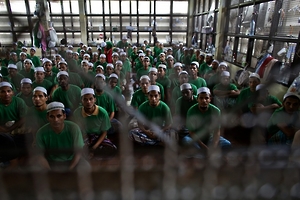Thailand: Release and Protect Rohingya ‘Boat People’
End Inhumane Detention, Family Separation of 1,800 Muslims from Burma
Thailand’s government should release ethnic Rohingya from Burma who are detained under inhumane and unsafe conditions, and ensure their protection needs are met.

Undocumented Rohingya Muslim immigrants gather at the Immigration Detention Center during the Muslim holy fasting month of Ramadan in Kanchanaburi province, Thailand on July 10, 2013.
On August 13, 2013, the Thai cabinet considered a plan to transfer 1,839 Rohingya who have been held in immigration detention facilities and social welfare shelters across Thailand to refugee camps on the Thai-Burmese border.
“Some senior Thai officials have recognized the Rohingya’s plight but they are still considering proposals that would keep them detained,” said Brad Adams, Asia director. “The Thai government needs to end the inhumane detention of Rohingya and ensure the United Nations refugee agency and other international organizations have full access to provide much needed protection and assistance.”
On August 9, the Thai minister of social development and human security, Paveena Hongsakula, told the media that the detention and trafficking of Rohingya in Thailand were serious human rights issues. Yet at a cabinet meeting four days later she proposed sending them to refugee camps, a plan that reportedly has the backing of Prime Minister Yingluck Shinawatra and Foreign Affairs Minister Surapong Tovichakchaikul. Despite the fact that many Rohingya fled “ethnic cleansing” and crimes against humanity last year in Burma’s Arakan State, the Thai government refuses to consider Rohingya as refugees.
The Thai authorities have also discussed proposals to create alternative centers for the Rohingya or expand the capacity to hold Rohingya at existing immigration detention centers in Songkhla, Ranong, Prachuab Khiri Kan, and Nongkhai provinces.
Since January, the Thai authorities have detained 2,055 Rohingya on the grounds that they entered the country illegally, according to the government. Thailand has separated Rohingya families. Rohingya men have been sent to various immigration detention centers, while Rohingya women and children have been held in shelters managed by the Ministry of Social Development and Human Security.
As documented by Human Rights Watch, Thai and Rohingya human traffickers have gained access to the government shelters and sought to lure out Rohingya women and children. For instance, in June, traffickers who promised to reunite Narunisa, a 25-year-old Rohingya in a shelter in Phang Nga province, with her husband in Malaysia for a 50,000 baht (US$1,660) fee, instead raped her repeatedly.
Many immigration detention centers are severely overcrowded and lack access to medical services and other basic necessities. Rohingya men are restricted to extremely cramped conditions in small cells resembling large cages, where they barely have room to sit. Some suffer from swollen feet and withered leg muscles due to lack of exercise because they have not been let out of the cells for up to five months. Eight Rohingya men have died from illness while in detention. Interventions by international agencies to provide health services, prompted in part by media exposure and international expressions of concern, have resulted in health improvements, but many Rohingya still face unacceptable risks to their health due to poor detention conditions.
“The Thai government should recognize its punitive detention policy towards the Rohingya is both inhumane and counterproductive,” Adams said.
Since July, Rohingya men fearful of being sent back to persecution in Burma or detained indefinitely in Thailand have staged protests at immigration detention facilities in Songkhla and Phang Nga provinces. Approximately 208 Rohingya men, women, and children have also escaped from detention to unknown locations.
The Thai authorities should allow Rohingya to seek migrant worker status, which would permit them to work and move freely. Because Burma’s government discriminates against the Rohingya, denying them Burmese nationality, Thailand should waive the nationality verification program requirement for migrant worker status.
“The Rohingya have fled horrific abuses in Burma that would put many at risk were they to return home,” Adams said. “Instead of sticking them in border camps or immigration lockups, the Thai government should consider allowing the Rohingya to remain, work, and live under temporary protection.”
source: Human Rights Watch
- 529 reads
Human Rights
Fostering a More Humane World: The 28th Eurasian Economic Summi

Conscience, Hope, and Action: Keys to Global Peace and Sustainability

Ringing FOWPAL’s Peace Bell for the World:Nobel Peace Prize Laureates’ Visions and Actions

Protecting the World’s Cultural Diversity for a Sustainable Future

Puppet Show I International Friendship Day 2020

